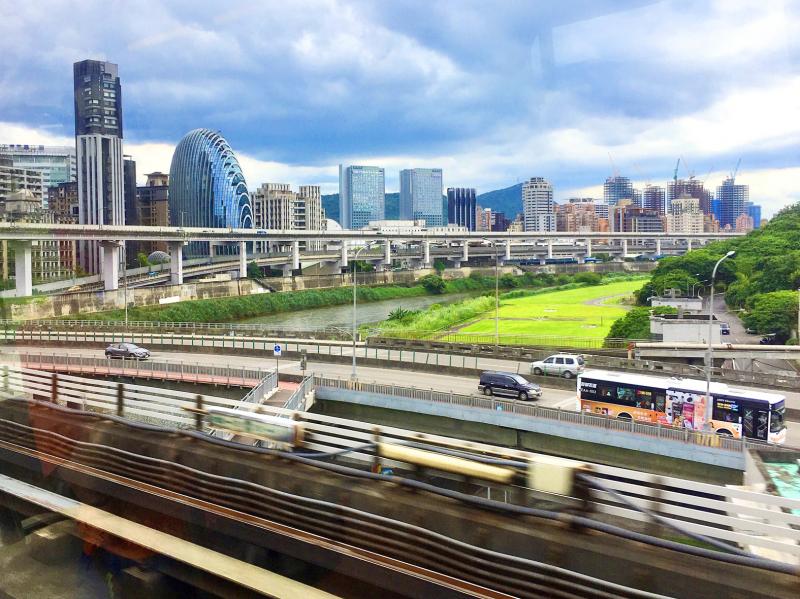Presale and new housing prices last quarter climbed 6.01 percent to NT$458,600 (US$15,323) per ping (3.3m2), although transactions slumped 29.71 percent as COVID-19 infections and interest rate hikes fueled caution on the part of developers and buyers, a survey by Cathay Real Estate Development Co (國泰建設) showed on Wednesday.
Developers and builders released 187 projects offering 16,473 new housing units that could generate NT$290.8 billion in sales, a 23.9 percent fall from the first quarter, on the central bank’s liquidity tightening policy and expectations that buying interest would weaken amid spiking COVID-19 infections, Cathay said.
However, asking prices rose in the municipalities of Taipei, Taoyuan, Taichung, Tainan and Kaohsiung, and in Hsinchu county and city, with New Taipei City seeing a fractional 0.11 percent decline to NT$496,700 per ping, it said.

Photo: Hsu Yi-ping, Taipei Times
Taoyuan reported the steepest price advance of 16.35 percent to NT$385,000 per ping as soaring building material prices and relative affordability provided developers with enough comfort to adopt a bold pricing strategy, Cathay said.
New housing prices gained 11.17 percent to NT$409,500 per ping in Hsinchu County and increased 8.98 percent to NT$422,200 per ping in Taichung, it said.
Prices grew 5.39 percent to NT$284,600 per ping in Tainan and scaled up 5.28 percent to NT$305,100 in Kaohsiung, it added.
The gauge on price concessions widened mildly by 1.21 percentage points to 8.93 percent, indicating the supply side generally refused to budge despite heightening economic headwinds, Cathay said.
The property market is likely to enter a consolidation phase, with room for price gains squeezed by inflation, interest rate hikes, unfavorable lending terms and ongoing COVID-19 infections, it said.
November’s elections of local administrators could also drive buyers to the sidelines amid political uncertainty, considering that candidates tend to pledge measures to mitigate housing unaffordability while campaigning, it said.
Separately, Sinyi Realty Inc (信義房屋) on Tuesday reported that net income fell 36.11 percent year-on-year to NT$313 million last quarter, as a COVID-19 outbreak and interest rate hikes dampened buying interest.
Earnings per share were NT$0.43 last quarter, compared with NT$0.67 a year earlier, when a level 3 COVID-19 alert kept people at home, Sinyi said, adding that for the first half of this year, net income decreased 16.77 percent year-on-year to NT$791 million, or earnings per share of NT$1.07.
Significant housing price gains across Taiwan and the central bank’s monetary tightening have made people more cautious this year, Sinyi said, adding that the central bank has asked people to be careful about financial leveraging.

TAKING STOCK: A Taiwanese cookware firm in Vietnam urged customers to assess inventory or place orders early so shipments can reach the US while tariffs are paused Taiwanese businesses in Vietnam are exploring alternatives after the White House imposed a 46 percent import duty on Vietnamese goods, following US President Donald Trump’s announcement of “reciprocal” tariffs on the US’ trading partners. Lo Shih-liang (羅世良), chairman of Brico Industry Co (裕茂工業), a Taiwanese company that manufactures cast iron cookware and stove components in Vietnam, said that more than 40 percent of his business was tied to the US market, describing the constant US policy shifts as an emotional roller coaster. “I work during the day and stay up all night watching the news. I’ve been following US news until 3am

UNCERTAINTY: Innolux activated a stringent supply chain management mechanism, as it did during the COVID-19 pandemic, to ensure optimal inventory levels for customers Flat-panel display makers AUO Corp (友達) and Innolux Corp (群創) yesterday said that about 12 to 20 percent of their display business is at risk of potential US tariffs and that they would relocate production or shipment destinations to mitigate the levies’ effects. US tariffs would have a direct impact of US$200 million on AUO’s revenue, company chairman Paul Peng (彭雙浪) told reporters on the sidelines of the Touch Taiwan trade show in Taipei yesterday. That would make up about 12 percent of the company’s overall revenue. To cope with the tariff uncertainty, AUO plans to allocate its production to manufacturing facilities in

COLLABORATION: Given Taiwan’s key position in global supply chains, the US firm is discussing strategies with local partners and clients to deal with global uncertainties Advanced Micro Devices Inc (AMD) yesterday said it is meeting with local ecosystem partners, including Taiwan Semiconductor Manufacturing Co (TSMC, 台積電), to discuss strategies, including long-term manufacturing, to navigate uncertainties such as US tariffs, as Taiwan occupies an important position in global supply chains. AMD chief executive officer Lisa Su (蘇姿丰) told reporters that Taiwan is an important part of the chip designer’s ecosystem and she is discussing with partners and customers in Taiwan to forge strong collaborations on different areas during this critical period. AMD has just become the first artificial-intelligence (AI) server chip customer of TSMC to utilize its advanced

Six years ago, LVMH’s billionaire CEO Bernard Arnault and US President Donald Trump cut the blue ribbon on a factory in rural Texas that would make designer handbags for Louis Vuitton, one of the world’s best-known luxury brands. However, since the high-profile opening, the factory has faced a host of problems limiting production, 11 former Louis Vuitton employees said. The site has consistently ranked among the worst-performing for Louis Vuitton globally, “significantly” underperforming other facilities, said three former Louis Vuitton workers and a senior industry source, who cited internal rankings shared with staff. The plant’s problems — which have not